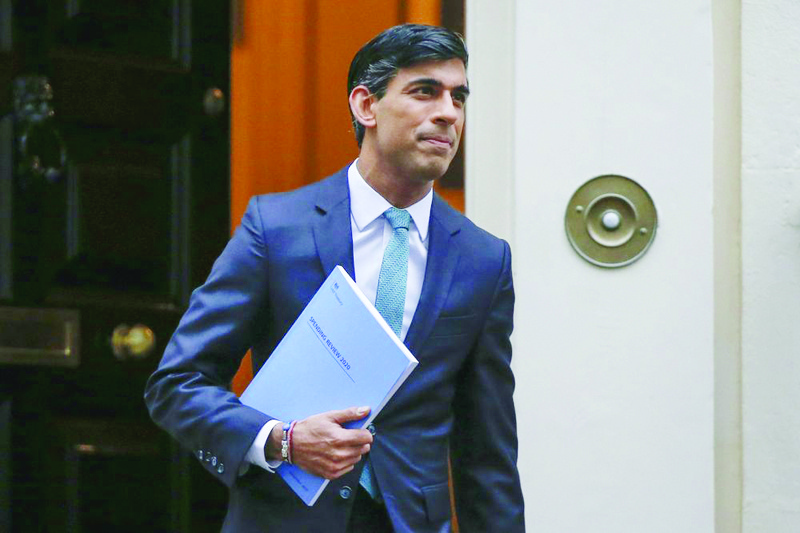 LONDON: Finance Minister Rishi Sunak, who delivers his annual budget on March 3, should focus on securing economic recovery instead of raising taxes to fix virus-ravaged public finances.
LONDON: Finance Minister Rishi Sunak, who delivers his annual budget on March 3, should focus on securing economic recovery instead of raising taxes to fix virus-ravaged public finances.
LONDON: Britain must use next month's budget to extend coronavirus financial support measures and tackle inequalities exacerbated by the COVID crisis before a gradual withdrawal as the virus lockdown is eased, analysts urged yesterday. Finance minister Rishi Sunak, who delivers his annual budget on March 3, should focus on securing economic recovery instead of raising taxes to fix virus-ravaged public finances, the Institute for Fiscal Studies (IFS) and Citi bank analysts said in a joint report.
Chancellor of the exchequer Sunak must also help the economy-which shrank by almost 10 percent due to the pandemic-adjust to the "triple challenge" of Brexit, COVID and the green energy transition, they added. "The budget needs to announce well-targeted extensions in emergency support to households and employers over coming months," it said. "It also needs to set out a plan for phasing them out. The economy cannot adjust and recover until most of this support has been removed.
"The chancellor also needs to set out plans for how to help the economy recover and adjust to a new normal," it added. The government's furlough jobs support scheme, which was launched in March during Britain's initial COVID-19 lockdown, is scheduled to stop at the end of April. Economists fear that the demise of the scheme, which pays the bulk of wages for millions of private-sector workers, could spark a fresh surge in unemployment. The IFS said that lower-income households had not been able to save as much cash as richer counterparts, sparking greater inequality in society during the crisis.
"Any significant continuation of the furlough scheme must be limited and carefully targeted," said IFS director Paul Johnson. "In the recovery phase, (Sunak) needs to support jobs and investment, but also crucially needs to recognize and address the multiple inequalities exacerbated by the crisis." Britain's economy shrank by a record 9.9 percent last year on the fallout from the coronavirus, official data showed, but a rapid vaccines rollout has boosted the outlook.
Activity was also hampered by Brexit turmoil ahead of Britain's final exit from the European Union at the end of last year. "Over the year 2020 as a whole, GDP contracted by 9.9 percent, marking the largest annual fall in UK GDP on record," the Office for National Statistics said in a statement.
Gross domestic product grew 1.0 percent in the fourth quarter or three months to December, after an upwardly-revised third-quarter expansion of 16.1 percent. The economy plunged into a historic recession in the first half and shrank a record 19 percent in the second quarter as the pandemic erupted.
Vaccine-driven rebound
Britain could still face a potential double-dip recession on the back of the latest lockdown that has been in place since January, but a vaccine-driven bounceback is widely forecast. "The further restriction measures implemented in early January in light of new, more virulent strains of coronavirus have placed a firm dent in the UK's path to recovery," said economist Sam Miley at the Centre for Economics and Business Research. "Nevertheless, we expect the UK economy to bounce back in the second half (of the) year, once the rollout of coronavirus vaccines has provided protection to a sufficient proportion of the population."
The data came one week after the Bank of England (BoE) forecast a recovery on the back of the Covid-19 inoculation program, under which more than 13.5 million people have received a first dose. "Figures show that the economy has experienced a serious shock as a result of the pandemic, which has been felt by countries around the world," Sunak said. "While there are some positive signs of the economy's resilience over the winter, we know that the current lockdown continues to have a significant impact on many people and businesses."
Economy 'like coiled spring'
Much of the UK re-entered lockdown in early January to curb a variant COVID-19 strain that was deemed more transmissible, with restrictions similar to the initial curbs imposed in late March last year. The BoE last week forecast that the economy would contract 4.0 percent in the first three months of this year, but added that recovery would then take root as vaccines help boost consumer spending-with activity returning to pre-COVID levels in early 2022.
The British central bank's chief economist Andy Haldane, writing the Daily Mail newspaper on Friday, declared that the post-COVID economy would rebound "like a coiled spring". "The rapid rollout of the vaccination program across the UK means a decisive corner has been turned in the battle against COVID," wrote Haldane. "A decisive corner is about to be turned for the economy too, with enormous amounts of pent-up financial energy waiting to be released, like a coiled spring. " - AFP
.jpg)



